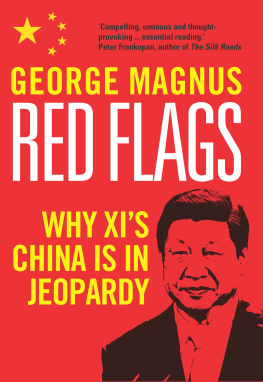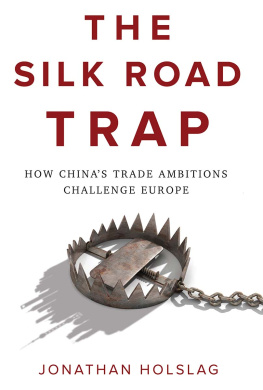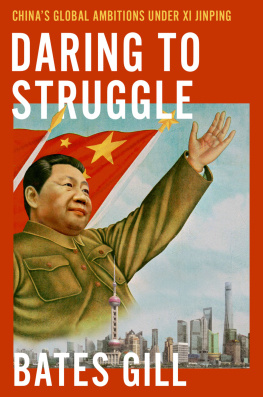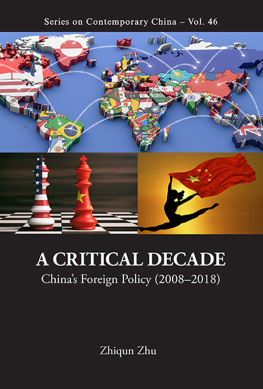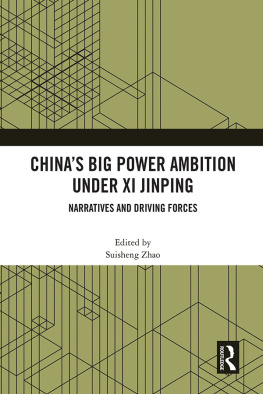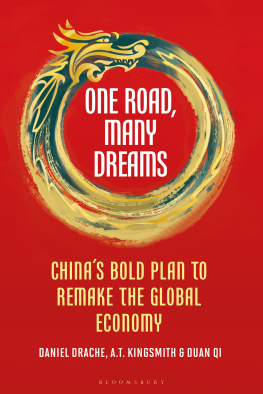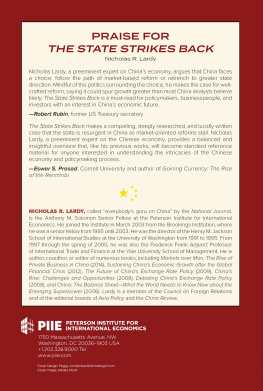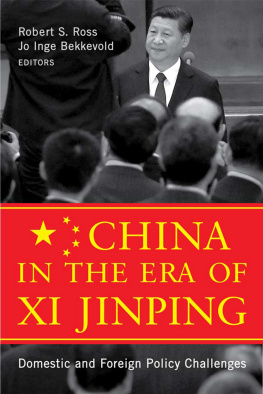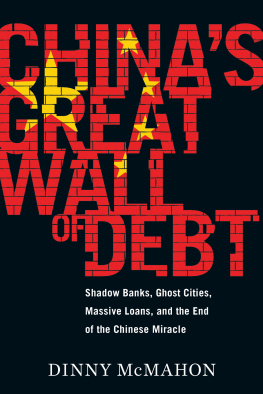RED FLAGS

Copyright 2018 George Magnus
All rights reserved. This book may not be reproduced in whole or in part, in any form (beyond that copying permitted by Sections 107 and 108 of the U.S. Copyright Law and except by reviewers for the public press) without written permission from the publishers.
For information about this and other Yale University Press publications, please contact:
U.S. Office:
Europe Office:
Set in Adobe Caslon Pro by IDSUK (DataConnection) Ltd
Printed in Great Britain by TJ International, Padstow, Cornwall
Library of Congress Control Number: 2018947835
ISBN 978-0-300-23319-3
A catalogue record for this book is available from the British Library.
10 9 8 7 6 5 4 3 2 1
To Lesley, Daniel, Kerri and Elias, Jonathan, Rachel and Ben
CONTENTS
ACKNOWLEDGEMENTS
While writing this book, I was driven to emphasise at various points that President Xi Jinpings China was turning out to be different from the China that most of us have known for the last twenty to thirty years. None of us can know now whether he will be the equivalent of a good or bad emperor, but the one thing we can say with some certainty is that the outlook for Xis China cannot be drawn with lines from the past: it has reached the end of extrapolation. In a rather curious way, then, I feel I owe a small debt of gratitude to President Xi, because he has inadvertently added some frisson to my title. It is his China, and he will take all the credit or shoulder all the blame for whatever happens on his now extended watch.
I wanted to write an accessible book about the prospects for and challenges facing Xis China because, as the twenty-first century matures, I think we all need to understand more about the Middle Kingdom. Regardless of what happens, it will certainly play a prominent role in shaping the world and affecting our lives and those of our progeny. It all came together thanks to some important recent developments in China, and two meetings.
In 201516, China succumbed to significant financial and economic turbulence. Until then Xi Jinping hadnt paid much attention to economic matters, but in the spring of 2016 I was visiting China when the now well-known authoritative person front-page interview in the Peoples Daily appeared, warning that China had to change course. Speculation about the persons identity centred on Liu He, then head of the National Reform Development Committee, and now vice premier and in charge of economic and financial affairs overall. Everyone knew the intervention was important. At the same time, speculation about the following years 19th Party Congress was starting. It felt at the time as though important changes in China were afoot. And so it has proven to be.
The decision to get on with drafting emerged during a typically convivial lunch with HSBCs senior economic adviser, Stephen King. Stephen is a wise and thoughtful economist, and when he revealed the title of his forthcoming book, Grave New World (published by Yale University Press in 2017), I thought this was one of the most inspired non-fiction titles Id ever come across. I had a chronic case of title envy, and try as I did to find a comparable play on great titles applied to a China book, it eluded me. Nevertheless, it spurred me to get on with the organisation of my own ideas and start writing.
Soon after, I had a meeting with Taiba Batool, commissioning editor at Yale University Press, who approached me to discuss the possibility of writing something that would slot into the companys economic book series. The last piece of the jigsaw fell into place, and the die was cast.
At various points in the drafting, I sent longer or shorter parts of the book for comment to a few people, who kindly responded with helpful suggestions, reminders and corrections. Guy de Jonquires, former Asia and trade editor of the Financial Times, and now senior fellow at the European Centre for International Political Economy, ploughed through the whole of an early draft. Victor Shih, political economist at the School of Global Policies and Strategy at the University of California, San Diego, and Chris Balding, formerly associate professor at the HSBC Business School in Shenzhen, also provided useful comments and tips on considerable sections of the book. Taiba Batool also laboured through the later drafts of the book offering her own expertise and suggestions to improve the content, flow and sequencing. A draft of the book was also sent out to three expert readers, who were anonymous to me, but who all reverted with comments that gave me cause for thought, and the opportunity to sharpen up. Thanks are also due to Rachael Lonsdale for her editing labours, and Ruth Killick for her work on promotion.
I would also like to acknowledge some of the many people whose thinking has contributed to the formation of my own understanding of Chinas politics and economics. I am deeply grateful to Rana Mitter, director of the China Centre at Oxford University, and Steve Tsang, director of the China Institute at the School of Oriental and African Studies (SOAS), both inspirational academics who took me on as a research associate. Also Bob Ash at SOAS, still imparting wisdom and who taught there when I was doing my MSc many years ago.
Others whose work, thinking and counsel I have always held in the highest esteem merit an important mention. Jon Anderson, a former colleague at UBS, who was the China, later emerging markets economist, runs the Emerging Advisors Group out of Shanghai. Simon Ogus, who was the head of Asian economics at Swiss Bank Corporation when it and UBS merged in 1997, was briefly a colleague before leaving to do a doctorate and then run DSG Asia out of Hong Kong. I never tire of reading and listening to Michael Pettis, a former trader turned professor of finance at Peking Universitys Guanghua School of Management, whom I have met at events in fancy hotels and in his hutong in Beijing. Joerg Wuttke, permanent representative of BASF in China, and former head of the EUChina Chamber of Commerce in Beijing, has been a never-ending source of business and political insight.
It has also been and remains my privilege to attend a regular series of China lunches in a private upstairs room in a Chinese restaurant in Soho, which is much less clandestine than it sounds, organised by Guy de Jonquires. The assembled wisdom of the attendees, who include Mick Cox, Jonathan Fenby, Roger Garside, Isabel Hilton, Christopher Hum, Nigel Inkster, Charles Parton, James Richards, Stein Ringen, Geoffrey Yu and Jie Yu is humbling and highly informative.
To all of these individuals, I would like to record my thanks for sharing their China acumen with me at various times and in different ways. I have benefited enormously from our exchanges and interactions, and absolve each and every one from any errors or misunderstandings in the book, which are, of course, mine entirely.
Finally, I should like to thank Lesley, my wife, for her love and unswerving support, especially during the researching and writing of the book, and my children, Daniel, Jonathan, Rachel and Ben, for their love and humour, often at my expense. I am sure I am not the only author to succumb to phases of tedium when the going gets tough, and when social skills become rather blunt. Lesley fully deserves my thanks for her endearing irreverence, and for keeping her head while I may have been losing mine.
London, June 2018
INTRODUCTION
In less than forty years, China has quintupled its share of global output, and transformed itself from a poor country and source of cheap toys and textiles to a fierce competitor in high-end manufacturing, advanced technologies and military might. It is the dominant power in Asia and a rival and adversary of the United States. Xi Jinping, who is general secretary of the Communist Party, chairman of the Central Military Commission, and president of China, is now one of the most powerful political leaders in the world. He insists that the primacy of the Party is indispensable to developing China in the twenty-first century and managing its growing footprint overseas. If his health holds and his opponents stay subdued, he could remain a strongman president for life.
Next page
